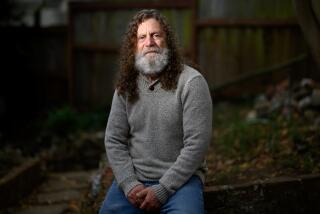Taking a Broader Look at Internet’s Influence
- Share via
We know what the Internet is doing for us, at least in terms of communication and access to prodigious amounts of information. But what is it doing to us?
Are we communicating less by substituting e-mailed one-liners for serious discussions with our colleagues? Are we relying too much on quick and easy access to Web pages instead of doing labor-intensive research? Is the American political process being helped or hindered by the communications revolution?
And in the aftermath of mischief by vandals who temporarily shut down a host of major Web sites in February, can we trust this new technology?
Probably every major university in the world has at least a few folks pondering those questions. Technology is evolving so rapidly and involves so many different arenas that any speculation is a bit risky. After all, how many people saw the Internet coming just a couple of decades ago?
But out of all the hype and confusion, one fact is indisputable, according to Bruce Bimber, director of the newly established Center for Information Technology and Society at UC Santa Barbara: More people have access to more information, more quickly and at less cost than at any other time in history.
Bimber is a former electrical engineer with roots in Silicon Valley who decided in the early ‘80s that he wanted to study what the computer revolution means for society, rather than contribute to the technology itself.
So he turned to political science and earned his doctorate at the Massachusetts Institute of Technology before returning to California to join the faculty at UC Santa Barbara. He concluded that the answers to the “big questions” are so difficult to find because they are being approached in a fragmented way.
“It’s a little like the proverbial elephant that was analyzed by blind people,” he said. “Some people are trying to figure out what the leg is, and some people are tugging on the tail, and some people are feeling the tusk, and we’re trying to put it all together and say what this information revolution portends.”
Bimber decided there had to be a better way, so he teamed up with an old colleague from his Silicon Valley days, Charles House, now vice president of Intel’s Dialogic Corp. Out of that came the creation of UC Santa Barbara’s center and a different approach to answering the big questions.
“We are a collaboration of the kind you don’t find very often in universities, between the college of engineering and the college of letters and science,” Bimber said. “That means we have English professors and anthropologists sitting down at the table with electrical engineers and computer scientists.”
The center includes about 20 professors from the university, housed in temporary quarters directly over the 1969 site of the 900-pound computer that was the university’s contribution to the Arpanet, which grew into the Internet.
The idea is to get electrical engineers, political scientists and others working together on such areas as the impact of the Internet on the American political system. Bimber suspects it will be great in some areas, but less so in many others.
“So far, the evidence suggests that the Internet is having no effect on people’s likelihood to vote,” he said. That, he said, is consistent with political history. People who are better informed are not necessarily more active politically.
“The fact that less than half the Americans vote, that glaring problem in American democracy, is unlikely to be changed in any way by all this stuff,” he said.
He cites the late 19th century, when there was little political information and the quality of public deliberation was extraordinarily low.
Yet that period, Bimber said, was “the one time when Americans were most engaged, where turnout was extremely high and people were turned on by politics.” Knowledge alone, he said, does not necessarily lead to political involvement.
By contrast, he said, it no longer takes buckets of money for political activists to get their message to the multitudes.
“Political muscle has typically been reserved for big traditional groups with a lot of resources,” Bimber said. Now it is a lot easier for anyone with a PC to find others with similar interests and develop a campaign for change in a matter of hours. People with limited resources, he said, finally have a voice in politics that isn’t likely to be drowned out by heavily endowed campaigns.
It’s too early to tell whether he will be right, but Internet usage continues to surprise us.
For example, new Internet users are far less likely to use it as a research tool and more likely to use it for basic communications, according to recent Carnegie Mellon University research. New users see the Internet primarily as a social tool, the study concludes.
But Bimber thinks this will probably change as computers become even more ubiquitous and the “wireless revolution” eventually frees us from the box. They will become a more integrated part of our lives and thus a far more powerful influence.
But how can we answer the big questions when technology is evolving so rapidly? The answer, Bimber said, is to avoid tying the questions to specific technologies of the day.
What clearly lies ahead is more information, rapid and cheap communications and an empowering of voices we have not heard before. Where that will lead, Bimber and his colleagues hope to figure out.
*
Lee Dye can be reached at leedye@gci.net.






